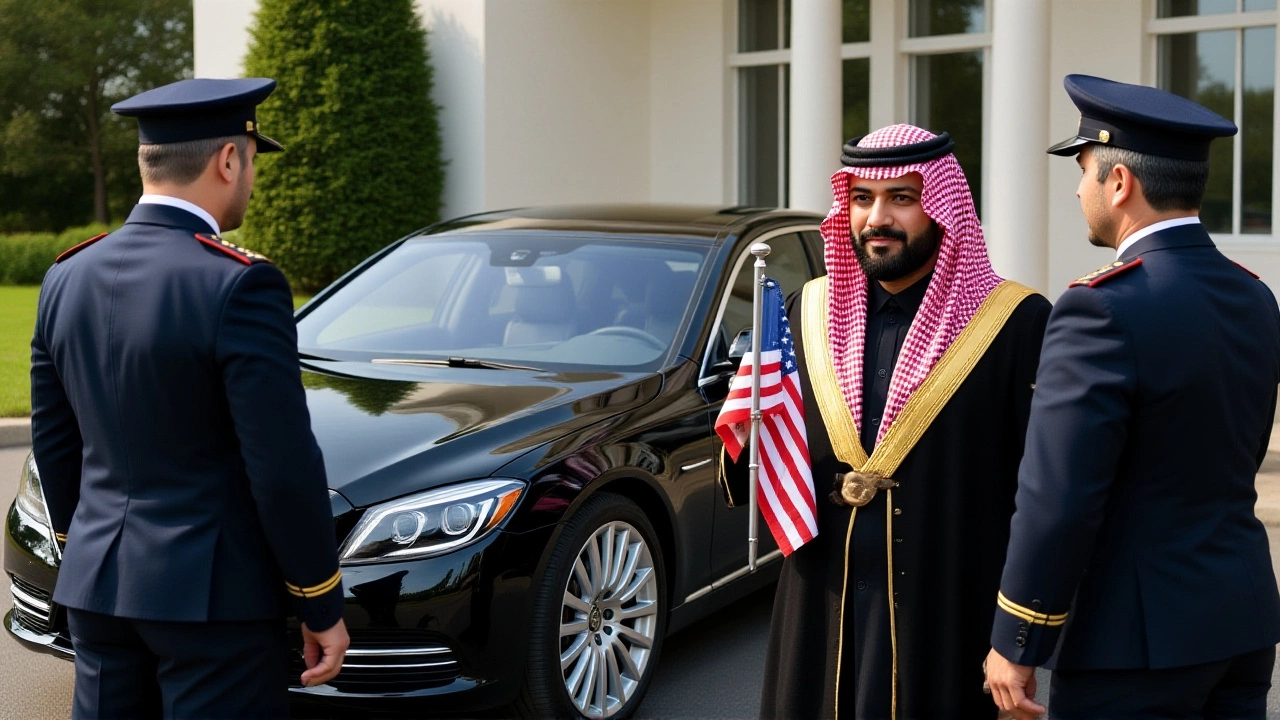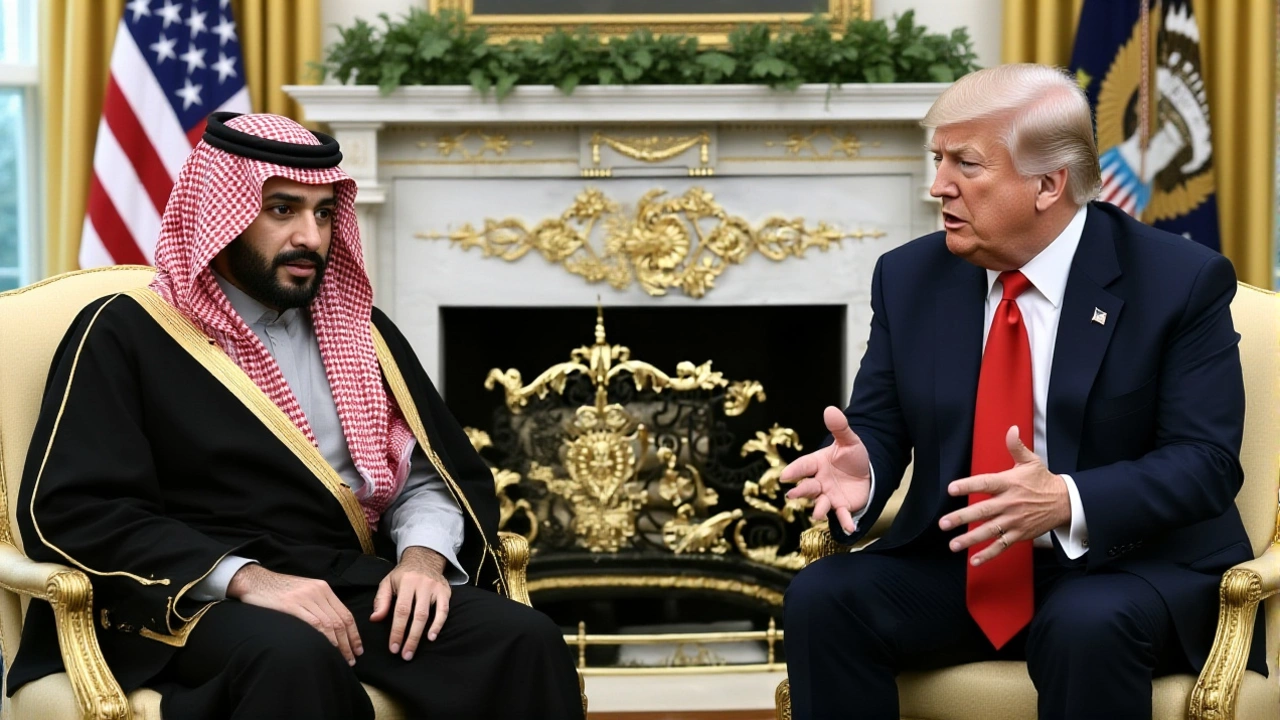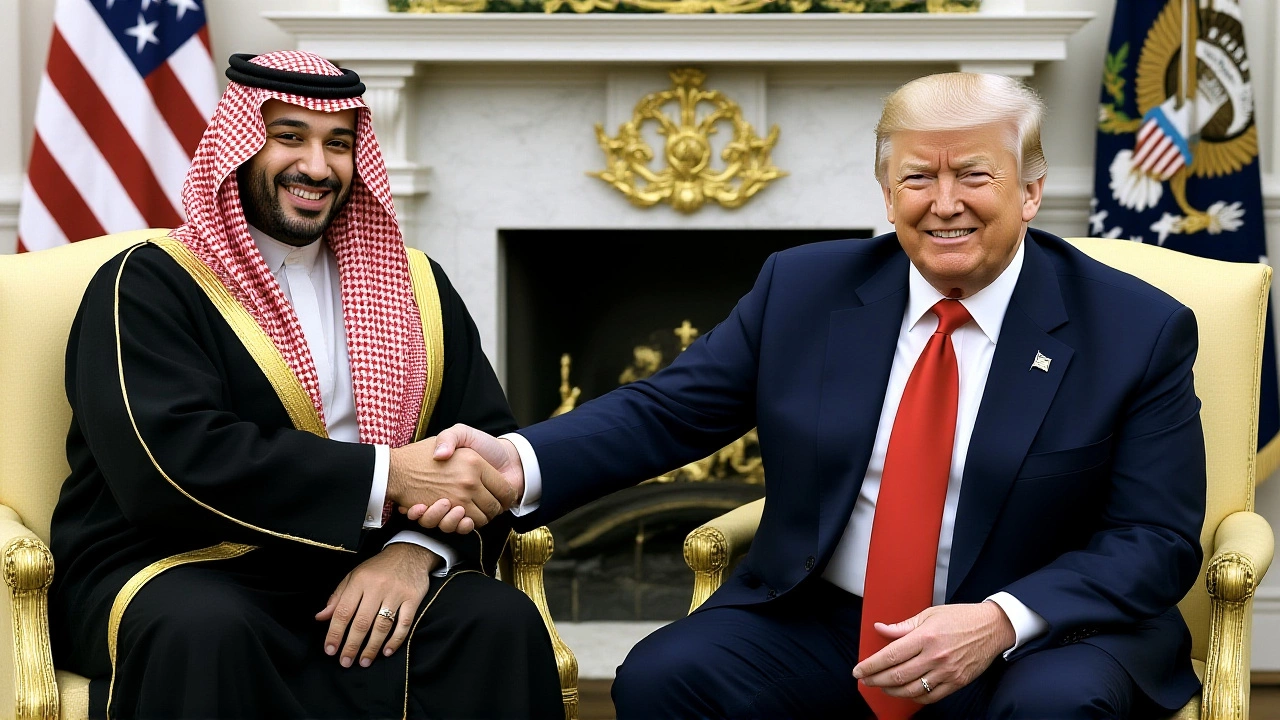When Donald J. Trump welcomed Mohammed bin Salman, the Crown Prince and Prime Minister of the Kingdom of Saudi Arabia, to the White House on November 18, 2025, the red carpet rolled out like a diplomatic amnesty. A military flyover, honor guard, and dual-flag lining marked a return to normalcy — seven years after the world learned Jamal Ahmad Khashoggi had been tortured and dismembered inside the Saudi consulate in Istanbul. But beneath the pomp, the air was thick with unresolved grief — from families of 9/11 victims, and from those who still remember Khashoggi’s last words: "I can’t breathe."
"Things Happen" — Trump’s Defense of a Controversial Ally
At 3:45 p.m. EST, as ABC News correspondent Mary Bruce pressed the Crown Prince on U.S. intelligence findings, Trump cut in — not with diplomacy, but with defiance. "Things happen," he said, "but he knew nothing about it, and we can leave it at that." He didn’t just dismiss the question. He dismissed the evidence. The 2021 declassified report, released by the Office of the Director of National Intelligence, had been unequivocal: "The Crown Prince viewed Khashoggi as a threat to the Kingdom and broadly supported using violent measures if necessary to silence him." Trump didn’t cite new facts. He didn’t challenge the methodology. He simply declared the truth inconvenient."You don’t have to embarrass our guest," Trump added, turning on Bruce. Then came the twist: "A lot of people didn’t like that gentleman that you’re talking about." The implication? Khashoggi’s journalism — his critiques of the Saudi monarchy, his columns in the Washington Post — somehow made him deserving of his fate. That’s not just denial. It’s moral inversion.
"A Huge Mistake" — MBS’s Calculated Regret
The Crown Prince, 39, offered a carefully calibrated response. "I feel painful about families of 9/11 in America," he said, acknowledging the grief without accepting responsibility. On Khashoggi, he called it "painful for us in Saudi Arabia," admitted it was "a huge mistake," and claimed Saudi Arabia had "done all the right steps of investigation, etc." But here’s the problem: no Saudi official has ever been held criminally accountable. The eight men convicted in absentia in 2020? All were low-level operatives. The masterminds? Still in power. One of them, Saud al-Qahtani, remains a senior advisor to MBS.And yet, he’s now being treated like a reformer. Trump praised his "incredible" human rights record — a claim that flies in the face of Saudi Arabia’s continued crackdown on women’s rights activists, its war in Yemen, and its use of facial recognition to track dissidents. In 2023 alone, Human Rights Watch documented 34 executions for non-violent offenses. Yet here, in the Oval Office, it was all about investment — nearly $1 trillion in pledged Saudi capital, according to Politico. This wasn’t a state visit. It was a deal signing with a side of whitewashing.

9/11 Families: The Uninvited Witnesses
The irony was crushing. Fifteen of the 19 hijackers on September 11, 2001, were Saudi nationals. The 9/11 Commission found no evidence of direct Saudi government involvement — but also no evidence of full transparency. Families like those of John O’Neill, the former FBI counterterrorism chief who died in the towers, and Christine Breeden, whose daughter was killed in the Pentagon, have spent two decades demanding accountability. They didn’t get it from the Saudis. They didn’t get it from the Bush or Obama administrations. And now, they’re watching Trump hand MBS a rose."We’ve been ignored for 24 years," said Christine Breeden in a statement released hours after the meeting. "Today, the White House didn’t just welcome a man accused of murder — it honored him. What message does that send to the families of 9/11? That justice is negotiable?"
The 2,600-Day Shadow
November 18, 2025, was exactly 2,600 days since Khashoggi’s murder. Eight thousand, seven hundred and sixty-five days since the Twin Towers fell. Those aren’t just numbers. They’re anniversaries of trauma. And yet, the White House chose to celebrate a man who, according to U.S. intelligence, ordered a killing that shocked the world — and then spent years denying it.The optics were grotesque. A prince who once boasted about "beheading" critics now sits across from a former president who once called him "a great guy." The same president who, in 2018, dismissed Khashoggi’s murder as "a terrible thing" — but then praised Saudi arms deals as "a win for American workers." The consistency is chilling.

What’s Next? Congressional Backlash and Global Reckoning
Lawmakers are already reacting. Senate Foreign Relations Committee Chair Bob Menendez told reporters on November 19 that he plans to introduce a resolution condemning the White House’s reception of MBS by December 5. "This isn’t just about Khashoggi," he said. "It’s about whether the United States still believes in accountability — or if we’ve become a country that trades principle for profit."Meanwhile, in Europe, the European Parliament is reviewing its defense cooperation agreements with Saudi Arabia. Canada has quietly paused arms exports. The United Nations Special Rapporteur on extrajudicial killings, Agnes Callamard, who led the 2019 investigation into Khashoggi’s death, issued a statement: "When states normalize the unaccountable, they don’t just forgive a crime — they invite more."
And here’s the quiet truth: MBS knows this visit is his ticket back into global legitimacy. He doesn’t need to apologize. He just needs someone powerful enough to say, "It’s over." Trump just did.
Frequently Asked Questions
Why does the U.S. keep engaging with MBS despite the Khashoggi murder?
The U.S. prioritizes strategic interests — including oil stability, military contracts, and countering Iran — over human rights. Saudi Arabia is the world’s largest oil exporter and a key buyer of U.S. arms, with over $110 billion in defense deals signed since 2017. Despite global condemnation, Washington has consistently chosen economic and geopolitical leverage over moral accountability.
What did U.S. intelligence actually conclude about MBS and Khashoggi’s murder?
The February 2021 declassified report from the Office of the Director of National Intelligence concluded that MBS "broadly supported using violent measures if necessary to silence" Khashoggi. It cited intercepted communications and intelligence from multiple sources, including a phone call in which MBS instructed his aides to "get rid of him" — a phrase confirmed by Turkish investigators. No other Saudi official was deemed to have the authority to order such an operation.
Has Saudi Arabia ever held anyone accountable for Khashoggi’s killing?
Five individuals were sentenced to death in 2019, but they were later pardoned by Khashoggi’s family — a move widely seen as coerced. Eight others received prison terms, but none were senior officials. The two men believed to have led the operation — Maher Mutreb and Salah al-Tubaigy — remain in government positions. No one with ties to MBS has faced international prosecution.
Why are 9/11 families so angry about MBS’s visit?
While the 9/11 Commission found no direct Saudi government involvement, 15 of the 19 hijackers were Saudi nationals, and U.S. investigators uncovered evidence of financial and logistical support from Saudi citizens linked to the royal family. Families feel the U.S. has never fully confronted Saudi Arabia’s role — and now, by honoring MBS, Washington is signaling that accountability is optional.
What impact could this visit have on U.S.-Saudi relations?
The visit signals a full normalization of MBS’s international standing, potentially weakening pressure on Saudi human rights abuses. But it also risks alienating U.S. allies in Europe and the Gulf, who have pushed for accountability. Congressional backlash and potential sanctions under the Global Magnitsky Act could follow, especially if Congress passes resolutions condemning the reception.
Is there any legal recourse for Khashoggi’s family or U.S. victims?
Turkey continues to pursue legal action in absentia, and a U.S. federal lawsuit filed by Khashoggi’s fiancée, Hatice Cengiz, is ongoing under the Alien Tort Statute. Meanwhile, the U.S. Justice Department has not pursued charges against MBS, citing sovereign immunity. But experts say if MBS ever travels to a country with universal jurisdiction — like Germany or Sweden — he could face arrest.
